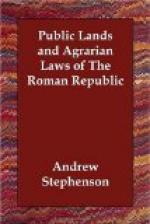to usurious speculations which at this time held chief
place among the Romans. Even Cato was a usurer
and recommended usury as a means of acquiring wealth.
Or they engaged in vast speculations in land, commerce,
and slaves, as Crassus did a little later. The
first mentioned class was the least numerous.
To those nobles who gave their attention to money-getting
must be added those plebeians who elevated themselves
from the masses by means[43] of the curule magistracies.
These were insolent and purse-proud, and greedy to
increase their wealth by any means in their power.
Next to these two divisions of the nobility came those
whom the patricians had been wont to despise and to
relegate to the very lowest rank under the name of
aerarii; merchants,[44] manufacturers, bankers,
and farmers of the revenues. These men were powerful
by reason of their union and community of interests,
and money which they commanded. They formed a
third order and even became so powerful as to control
the senate and, at times, the whole republic.
In the time of the Punic wars the senate had been obliged
to let go unpunished the crimes committed by the publican
Posthumius and the means which he had employed in
order to enrich himself at the expense of the republic,
because it was imprudent to offend[45] the order of
publicans. Thus constituted an order or guild,
they held it in their hands at will to advance or
to withhold the money for carrying on wars or sustaining
the public credit. In this way they were the
masters of the state. They also grasped the public
lands, as they were able to command such wealth that
no individual could compete with them. They thus
became the only farmers of the domain lands, and they
did not hesitate to cease paying all tax on these.
Who was able to demand these rents from them?
The senate? But they either composed the senate
or controlled it. The magistrates? There
was no magistracy but that of wealth. The tribunes
and the people? These they had disarmed by frequent
grants of land of two to seven jugera each, and by
the establishment of numerous colonies. This
was beyond doubt the real reason for their frequent
distributions. They had all been made from land
recently conquered. The ancient
ager had
not been touched, and little by little the Licinian
law had fallen into disuetude.
[Footnote 1: Livy, VIII, 11, 12.]
[Footnote 2: Ihne, I, 447.]
[Footnote 3: I have followed Ihne and Arnold
in giving this date, but there is reason for placing
it later as Valerius Maximus says, IV, 3,5: “Manius
Curius cum Italia Pyrrhum regem exegisset ... decretis
a senatu septenis jugeribus agri populo.”]
[Footnote 4: “Manii Curii nota conscio
est, perniciosum intellegi civem cui septem jugera
non essent satis.” Pliny, Hist.
Nat., XVIII.; Aurelius Victor, De Viris Illus.:
Septenis “jugeribus viritim dividendis, quibus
qui contentus non esset, eum perniciosum intellegi
civem, nota et praeclare concione Manius Curius dictitabat.”
The same author speaks of four jugera being given
by Curius, “Quaterna dono agri jugera viritim
populo dividit.” Juvenal implies a distribution
of two jugera; Sat. XIV, V, 161-164:




